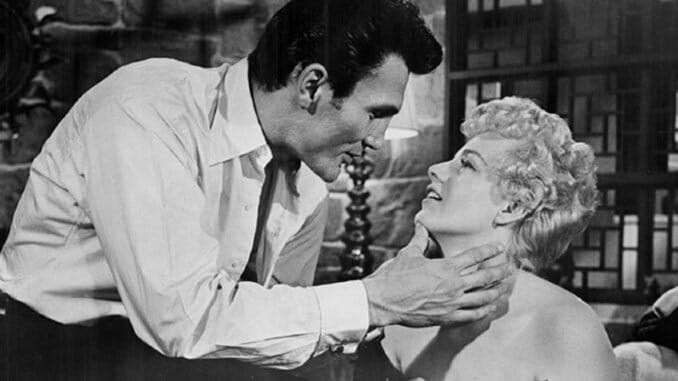How Jack Palance’s Typecast Villain Became Robert Aldrich’s Unlikely Hero

Over his half century in Hollywood, Jack Palance played villain after villain after villain. He nearly unleashed a plague upon the world in Panic in the Streets (1950). He was Oscar-nominated for terrorizing Joan Crawford in Sudden Fear (1952) and Alan Ladd in Shane (1953). Later on, he was Dracula, Jack the Ripper, Attila the Hun, Jekyll and Hyde, the son of Genghis Khan, Beelzebub…nine times out of ten, if he showed up in a movie, it was not to bring the lead character flowers.
Early in his career, however, Palance made three films with acclaimed director Robert Aldrich—The Big Knife (1955), Attack (1956) and Ten Seconds to Hell (1959)—in which he was the hero. His was a complicated kind of heroism. Aside from his established villainous persona, Palance’s strikingly unusual features and disconcertingly intense manner meant that he was never going to be a traditional leading man. That’s what made these performances so interesting.
In The Big Knife, Palance is Charlie Castle, a successful Hollywood actor who stars in mindless crowd-pleasers for studio boss Stanley Hoff (played with typical scenery-chomping malice by Rod Steiger). The time has come for Charlie to sign a new seven-year contract. He doesn’t want to. He’s yearning for a challenging project, and his beloved but estranged wife Marion (Ida Lupino)—fed up with seeing his soul eroded by the dross in which he’s been acting—has threatened to leave him once and for all if he signs the deal. The problem: Hoff has information on Charlie that could send him to jail, and has no qualms about using it.
There are no easy answers for Charlie. The drama of The Big Knife resides in the tortured contours of Palance’s face as he desperately searches for an escape from this impossible situation. The film is a noir, and Charlie is every inch the antihero. We can see that he’s an essentially decent man; he’s kind to his wife, his friends and the people who work for him. But he’s in a mess of his own making. He’s imprisoned himself in his own gilded cage, and wrecked several other lives in the process. By multiple measures, he’s not exactly worthy of our sympathy.
And yet he gets it, chiefly thanks to the acute physicality of Palance’s performance. At 6’4”, his hulking frame was often used to add another layer of intimidation to his already threatening presence. In The Big Knife, it has the opposite effect. Because there is so much of him, it makes even more of an impact when he curls up in anguish, or paces his opulent living room in cornered-animal distress. Other noir antiheroes—your Mitchums and Bogarts—emoted as little as possible, doing most of their acting with arched eyebrows and drawled witticisms; the less they spoke, the less they’d give away. Palance gives everything away. He’s so nakedly vulnerable, you almost want to drape a coat over his shoulders and tell the cameraman to go pick on someone his own size.
The Big Knife is based on a play by Clifford Odets, and Palance is, in a sense, on stage the whole time. Even when another actor is commanding the scene (this is a film brimming with big performances), Aldrich keeps our attention on Palance’s visceral discomfort—so palpable in the way he writhes in almost physical pain as Steiger sears him with a fiery monologue, or fruitlessly tries to swat away the amorous advances of his friend’s wife (Jean Hagen). He’s an active performer playing a passive character; an actor of imposing strength rendered powerless. Aldrich uses the juxtaposition between Palance’s persona and Charlie’s character to add depth to his portrait of a doomed man.
In Attack, Palance’s heroism is more traditional. He’s Lieutenant Joe Costa, the competent and well-liked leader of an American squad fighting in France in WWII. Unfortunately, his immediate superior, Captain Erskine Cooney (Eddie Albert), is weaselly and bungling; in the opening scene we see his cowardice cost the lives of several men, and we soon learn that’s not the first time his poor decisions have come with a body count. But thanks to some stateside political shenanigans, there’s no removing Cooney from his dangerously powerful position.
-

-

-

-

-

-

-

-

-

-

-

-

-

-

-

-

-

-

-

-

-

-

-

-

-

-

-

-

-

-

-

-

-

-

-

-

-

-

-

-








































